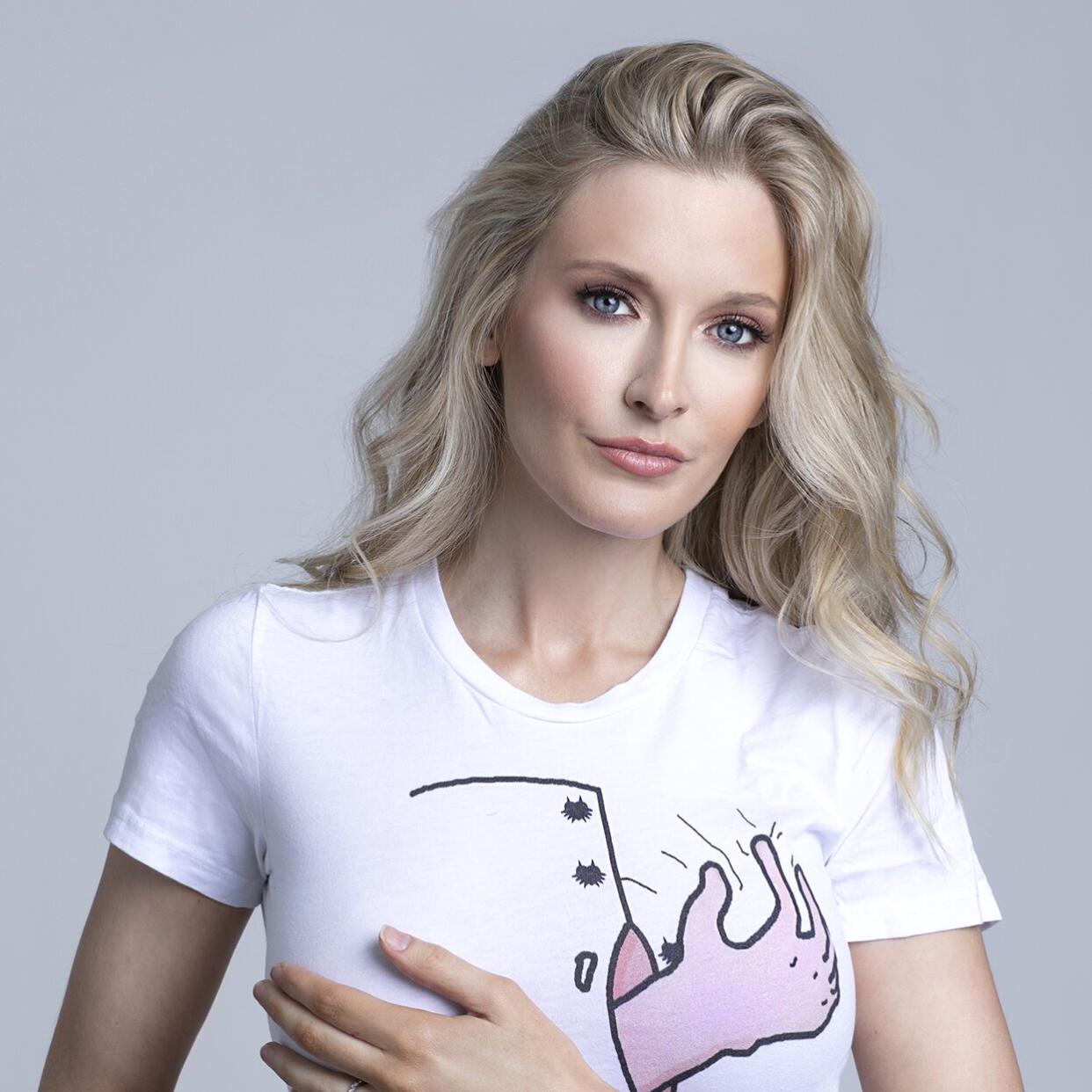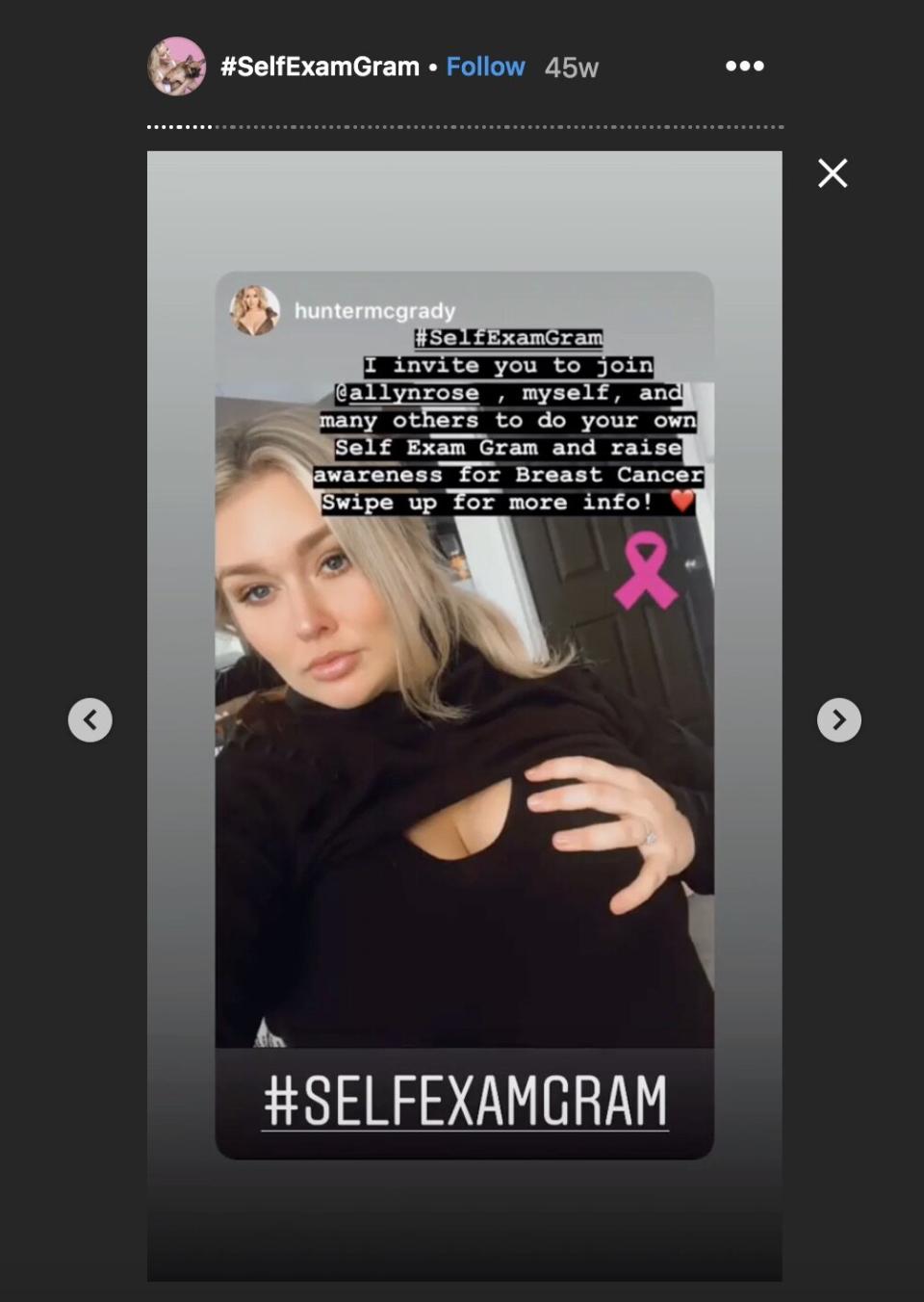Meet the Woman Behind #SelfExamGram, a Movement Encouraging Women to Perform Monthly Breast Exams

Jessie Palumbo Photography
Allyn Rose was only 26 years old when she underwent a double mastectomy and breast reconstruction. But she didn't choose these procedures because of a breast cancer diagnosis. She chose them as a preventative measure after losing her mom, grandmother, and great aunt to the disease. This was just the beginning of her journey of breast cancer advocacy.
"[It started in] December of last year," Allyn tells Shape. "I was sitting at home alone and thinking, 'What's something I can do to really motivate young people to be proactive in their health care?'"
Now, on the first of every month, Allyn takes to Instagram with a selfie and a hashtag: #SelfExamGram. Each post serves as a monthly reminder to women of the importance of breast self-exams and knowing what's "normal" for your body.
Allyn's interest in health advocacy comes in large part from her late mother, Judy's dedication to living an empowered, healthy lifestyle. After losing Judy to breast cancer when Allyn was 16 years old, Allyn was determined to carry on her mother's passion.
"My mom had always been really proactive about her health," says Allyn. "[Before she was diagnosed with breast cancer,] she kept going to the doctor and saying, 'Something's wrong.' She was a marathon runner, and she was feeling really run-down, she wasn't recovering the same way she did before. And the doctor said, 'You're too young to have cancer. Come back and see us in six months.'" (Related: How Young Can You Get Breast Cancer?)
By the time Judy returned to the doctor, she had a "golf ball-sized" tumor in her breast. She was diagnosed with stage-three breast cancer at 27 years old.
"She fired all of her medical team, went to the medical library on her college campus, studied, and went back to the doctor saying, 'I want this, this, and this. Here's my plan of attack,'" shares Allyn. "And she beat this really aggressive breast cancer."
Unfortunately, Judy's breast cancer returned years later when Allyn was a teenager. "Again, she developed stage-three breast cancer. It progressed, and she lost her life," says Allyn.
When Allyn was 18 years old, her father brought up the idea of a preventative double mastectomy. "I'd just developed into the body that I have. I thought, 'Why the hell would I do something like this? I'm only 18 years old.' But my dad looked me straight in the face and said, 'You're going to end up dead like your mom. You need to be more proactive about this because it's not one person; it's not two people; it's multiple people in your family, and this is your unfortunate reality.'"
Though Allyn and her family members tested negative for a BRCA gene mutation (a common risk factor for breast cancer), her doctor still encouraged her to consider a preventative double mastectomy. "My physician said, 'You don't have the BRCA gene mutation, but you likely have something we just can't test for yet,'" explains Allyn. She took several years to really think about the decision, but given her family's health history, the fact that her mother was diagnosed with breast cancer at a young age, and her doctor's encouragement, Allyn says she ultimately made the right choice for herself. "I underwent my surgery and I've really never looked back," she says.
Of course, every person is different. While Allyn's decision may have taken her in a less common direction, the best general course of action is to follow breast cancer screening guidelines and consult with a doctor about the best options available.
Allyn, a former Miss America contestant, admits she received some criticism for her decision to have the surgery. "People [in the beauty pageant community] were really offended that I would have a surgery like this," she says. "And men were writing to me saying, 'How dare you mutilate your body?'"
However, she says the positives have far outweighed the negatives. "Every day, I get another message from somebody who says, 'I'm young, I didn't know I could [get a preventative mastectomy],' or even, 'I'm old, and I didn't have the bravery to do it; you're really giving me the motivation,'" she shares. "I feel like it's my duty to share the message."
These days, Allyn spreads that message in multiple ways. Through her #SelfExamGram movement, she helps women feel more secure in performing regular breast exams on themselves. "[Breast self-exams] seem so simple, but it's also such a hard question to answer: How do I do a self-exam? Of course, you touch your breasts. But no one really knows what the steps are, what to look for, and if you find a lump, what do you do?" she explains. (Related: 11 Signs of Breast Cancer Every Woman Should Know About)
In addition to her monthly posts, Allyn also has an Instagram Story highlight with a breast self-exam video tutorial, along with screenshots of the dozens of women she's inspired to follow her lead and share their own #SelfExamGram posts. "I have people writing to me like, 'OK, I've seen your post like five times now, so I'm going to do it, too.' And that's really the whole point," says Allyn. (BTW, here's our tutorial on how to perform a breast self-exam.)

Instagram/@allynrose
Allyn's goal is to provide women with the resources she wished she'd had when she was undergoing her mastectomy and breast reconstruction. "I think there are a lot of organizations out there for [older] women who are battling breast cancer," she explains. "But [there aren't as many resources] for someone who is in their 20s and going through it." (Related: What I Wish I Knew About Breast Cancer In My 20s)
To achieve that goal, Allyn now works with the AiRS Foundation, a non-profit organization that partners with physicians, health care providers, and health care centers to provide people with support, information, and resources (both financial and educational) for post-mastectomy breast reconstruction. (Related: Breast Cancer Is a Financial Threat No One's Talking About)
Allyn also recently launched a website called Previvor, a comprehensive resource supporting women and their breast reconstruction choices. The website offers more modern, approachable resources for young women seeking post-mastectomy breast reconstruction, including infographics explaining the different types of mastectomy and breast reconstruction procedures, accessible details about BRCA gene mutations and genetic testing, and a community hub encouraging women to "find their tribe" among other breast cancer awareness organizations.
"I wanted to make Previvor something that would help people who have that, 'Oh man I can't do this, this is going to ruin my life' feeling [about mastectomy and breast reconstruction]," shares Allyn. "I want them to go get access to the information and slowly work their way into the realities of the surgery."
And if you're someone who simply wants to learn how to do a self-breast exam, Allyn has a message for you, too: "Don't be afraid to slide into my DMs."
